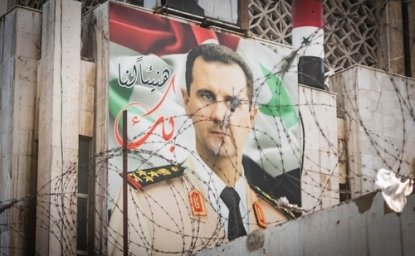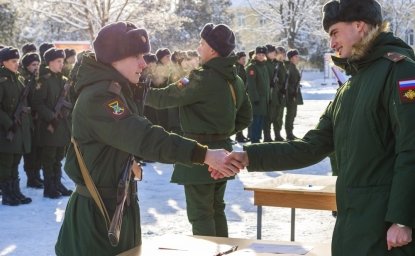
A blog of the Kennan Institute
BY ANDREI BABITSKY
There have been some debates recently about whether it is permissible—or productive—to call the Russian state fascist. “A time traveler from the 1930s,” writes the historian Timothy Snyder, one of the leading proponents of this view, “would have no difficulty identifying the Putin regime as fascist.” Ukrainian media routinely use the word ruscist (a blending of the words “Russian” and “fascist”) to describe the phenomenon. Some categorize Russia’s current regime as criminal. To use the Hungarian sociologist’s Balint Magyar’s term, it is a mafia state. But there are quite a few mafia states in the world.
The urge to label a criminal, dehumanizing regime with degrading epithets is understandable, but the range of epithets themselves just makes me think that there is something deeper going on. There is a quality to this regime that historical or legal terms fail to grasp. I will call this quality evil.
There is a difference between criminal and evil. A criminal chooses despicable means to achieve ends that are often mundane, like money, status, and power. In crime, there could be partners, but in evil one can only be a slave. A criminal is capable of striking a mutually beneficial market deal, whereas evil can never trust anybody unless it owns them. A criminal would torture people to find a hidden treasure, whereas someone evil would torture people because tortured people are easier to deal with. A criminal can stop, while an evildoer cannot.
This particular property of evil has been captured by writers. Arthur Koestler’s Darkness at Noon (1940), Orwell’s 1984 (1948), and The Rebel by Albert Camus (1956) all stress the impossibility of a will (let alone a free will) in a totalitarian society. Hannah Arendt wrote about the limitations of legal concepts in conveying the workings of evil. While murder can destroy a particular human life, crimes against humanity aim at eradicating “the universal concept of the human being,” she wrote.
Dehumanizing methods used by secret police in totalitarian systems, both fascist and communist, are well understood. Anna Funder, author of Stasiland: Stories from Behind the Berlin Wall, wrote of the “engineered psychological destruction” of a person. In order to do this, Stasi denied people jobs, spread rumors about them, or even broke into their houses and replaced a jar of jam with a different brand, just to mess with them and drive them to madness. It was pure evil, devoid of ambition and lacking an easily defined criminal goal, a conveyor belt of the destruction of the will. Vladimir Putin, of course, is an heir to these methods and seems to share its corresponding worldview.
Nowadays, political scientists use different words to describe similar phenomena. They call it the “erosion of institutions,” “weaponization” (of something harmless), or “bad governance.” Indeed, all these things are pillars of the Russian regime. But you do not need to be a political scientist to instantly recognize the driving force behind it all: the unwillingness or inability to deal with people possessing of free will.
For the Russian state, taking advantage of a person is never enough; it wants to own you. This quality is so deeply ingrained that it cannot help proving it again and again. Money, blackmail, hostage-taking, threats of violence: anything that works to that end, goes. The range is broad, from buying up foreign politicians to occupying a nuclear plant and threatening Europe with a nuclear disaster. There is no gain in it, except the feeling that now the Kremlin holds everybody at gunpoint and can boss them around.
Pitching a Deal With Devil
Yevgeny Prigozhin, a business tycoon from Saint Petersburg, is an old crony of Putin’s and a state contractor. He is credited with managing the Wagner Group, a quasi-private military company that is currently fighting in Ukraine. According to Russia Behind Bars, a respected prisoners rights’ watchdog, Prigozhin has been recruiting inmates, including those serving time for murder, as fighters for the Ukraine front. The practice is illegal under Russian law. On a recent hiring tour in Russian prisons, Prigozhin wore the golden star of the Hero of the Russian Federation, the highest decoration in the country.
In at least two instances, as reported by two prisoners from two different penitentiaries, the inmates were forced into the prison yard, so Prigozhin could make his pitch and offer them what he called a “deal with the devil.” If these accounts are to be believed, he seemed to be more honest, or at least much more articulate, than in his rare media comments. His words, known only from witness accounts, were reported this way: “We are not the armed forces, we are a real militarized organized crime group. My boys go to African countries and, in a couple days, there is no one alive. In the same way, they are tearing down enemies in Ukraine. If you follow me, you will either get home free or die. You will have to kill enemies and follow orders. Those who will turn their backs on the enemy will be shot on the spot.” According to Olga Romanova, founder of Russia Behind Bars, between 7,000 to 10,000 convicts have been recruited so far.
I cannot get the picture out of my head; a crowd of convicted men, murderers and burglars among them, who are careless or desperate enough to consider signing the deal with the devil, in order to wager a slim chance for freedom against the real prospect of death. Or rather, they have been made desperate, because conditions in Russian prisons are hellish by anyone’s standards. They are already owned by the system, and this makes them ideal cannon fodder for the Wagner Group, where they will never be treated as equals. Their will is perceived as already broken.
Whatever the prisoners did in their previous lives, the real, palpable evil stands in front of them with a golden star on his chest. He advertises the Wagner Group as a once-in-a-lifetime opportunity, and many people within the group seem to be proud of themselves. But they pay a price for their special treatment and impunity. They exist outside of the normal order of things, they cannot disobey even the most careless and criminal order, and they will never be openly praised for their courage or buried with honors.
It’s telling that even Prigozhin himself, a personal friend of Putin’s, has first publicly worn his golden star while touring the prisons: he was decorated by secret decree. A deal with the devil is not something that is primarily immoral. Immorality is often part of deals. A deal with the devil is special because we know that the signatories will be deceived and will pay dearly for their desperate decision. This kind of deal is designed for the sole purpose of owning the signing party’s agency, not for any kind of mutual benefit. Crushing souls is its main goal.
Evil Brings No Benefits
Are there winners in this war? The war’s officially declared purpose has been to protect the people of the Donetsk and Luhansk regions. Are they better off now? They are worse off. Since 2014, the “people’s republics” have drifted ever further from normalcy. Since the full-scale war began, they turned into gulags. Russia owns their population. Russian troops hunt down men and forcibly conscript them into penal battalions. For the last eight years, the thinly hidden plan has been always to keep the place as miserable as possible without formally annexing it, and force Ukraine into pretending that it is one of its regions. That way, Russia could own the whole country, and not just a part of it. But since the plan failed, the local population was deemed dispensable.
The general population of Russia gains nothing from the war, to be sure. But maybe, just maybe, there is some inner circle of people who benefit from the war? Are there trusted cronies voluntarily committed to this war?
Economist Branco Milanovich, a student of inequality, has noted after the war in Ukraine started that we should reconsider the meaning of the word oligarch. Many countries have imposed sanctions on oligarchs on the premise that they could affect policies, and under threat they would persuade the state to end the war. But their political influence proved inadequate. They are now owned. Most of the oligarchs, who supported Putin for 20 years, have ended up both less influential and less wealthy than they used to be. They also feel betrayed—so much so that some of them have even made their dissatisfaction public.
When Russian troops occupy a Ukrainian city, they start searching for any agency there is to find and then eradicate it by kidnapping elected officials, torturing activists, and jailing journalists. Observers say that the Russian state weaponizes gas pipelines, granaries, and power plants, but in fact, it weaponizes people—friends and foes—using pipelines as simple communication systems. The Russian state is holding people hostage and turning nuclear plants into ticking bombs because fear and compassion are human weaknesses and so they can be used to own people.
My generation looked for metaphors for the fight between good and evil while watching the Star Wars movies. There, evil was a temptation, a seductive choice for some ambitious people. My younger colleagues, whose whole life has coincided with Putin’s reign, were brought up on Harry Potter. In J. K. Rowling’s books, evil affects everybody and spoils both the good and the bad characters, and everybody feels a little bit guilty and everybody has to work hard to retain their agency.
The argument will continue about which -isms are better descriptors of the Russian state. But the language of law or political science fails to get to the core of it. We should not be shy to use the word evil in these debates.
The opinions expressed in this article are those solely of the author and do not reflect the views of the Kennan Institute.
Author

Journalist; Host of “Snova Nikogda” podcast

Kennan Institute
The Kennan Institute is the premier US center for advanced research on Eurasia and the oldest and largest regional program at the Woodrow Wilson International Center for Scholars. The Kennan Institute is committed to improving American understanding of Russia, Ukraine, Central Asia, the South Caucasus, and the surrounding region though research and exchange. Read more

Explore More in The Russia File
Browse The Russia File
In Search of Russia’s Digital Trace in Romania’s Political Crisis

With Syria’s Collapse Russia’s Regional Power Play Disintegrates

Putin's Strategy Tests Europe's Defense Limits

